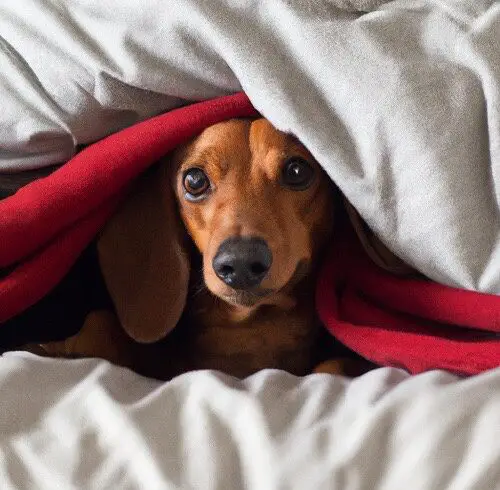Dachshunds, like all dogs, like to lie under covers from time to time. But how do dachshunds breathe under blankets?
Dachshunds, like many dogs, instinctively burrow under blankets for warmth, security, and comfort. This behavior mimics their natural instinct to dig into dens or burrows, environments where air circulation is limited but manageable.
Even when covered by blankets or lying under duvets or covers, there is enough air circulation to allow for breathing in a normal fashion.
The fabric of blankets is not airtight, and small gaps allow air to flow meaning it is completely safe for your dachshund and they breath as normal.
Dachshunds, with their keen instincts, often create a small pocket or “nest” that helps maintain a breathable space around their nose and mouth.
Dogs are highly adaptable creatures and can adjust their breathing rate and depth based on the available oxygen levels.
If the oxygen under the blanket becomes too low or carbon dioxide levels rise, the dachshund will instinctively move or adjust the blanket to allow more air in.
Dogs are more tolerant of higher carbon dioxide levels and warmer temperatures than humans. This tolerance allows them to breathe comfortably under blankets for longer periods.
However, they will eventually seek fresh air if it becomes uncomfortable or if the need for more oxygen arises.
Providing a pet-friendly blanket that is light and breathable can help ensure that your dachshund enjoys the comfort without any risk.
Is It Dangerous For Dogs To Be Under Blankets Or Duvets?
Having dogs under blankets or duvets is generally safe, especially if the dog chooses to do so on its own.
Many dogs, including dachshunds, enjoy the warmth and security of being under covers. However, there are some considerations to ensure their safety.
Ensure that the blanket or duvet is not too heavy or tightly wrapped around the dog, as this could restrict breathing.
Most dogs will naturally adjust their position or the blanket itself if they feel uncomfortable or have difficulty breathing.
It’s important to monitor for signs of overheating, such as excessive panting, agitation, or trying to get out from under the blankets but being unable to do so.
Very young puppies, elderly dogs, or dogs with mobility issues might find it harder to adjust their position or get out from under heavy blankets. Extra care should be taken to ensure they are not at risk of suffocation or overheating.
Some dogs might chew on blankets or duvets, which can pose a choking hazard if they ingest fabric or stuffing.
Ensure that any blanket or duvet used does not easily tear and is free of loose threads or decorations that could be swallowed.
Reasons Why My Dog Likes To Sleep Under A Blanket
Dogs may choose to sleep under blankets for several reasons, often driven by instinct, comfort, and the environment.
Many dogs, especially breeds that were historically bred for burrowing or hunting small game, have an instinctual desire to burrow into tight spaces.
This behavior is a natural instinct to create a snug, safe place to rest, similar to a den in the wild.
Blankets provide warmth and comfort, especially in cooler climates or during the colder months. Dogs, much like humans, seek out cozy, warm spots to sleep.
The blanket acts as an insulator, holding in body heat, and creating a warm microenvironment that can be particularly appealing to dogs.
Sleeping under a blanket can give a dog a sense of security and safety, as it mimics the feeling of being in a protected, enclosed space. This can be soothing for dogs, especially those that may be anxious or nervous.
Blankets can hold scents well, and being under a blanket can surround a dog with familiar smells, including their own scent or the scent of their human family members.
This can be comforting and reassuring to a dog, making them feel more relaxed and at home.
Some dogs may also seek privacy and solitude, especially in a busy household. A blanket provides a barrier from the environment, offering a personal space where they can relax without being disturbed.
Just as humans have sleeping preferences, dogs can develop their own sleeping habits and preferences. If a dog has had positive experiences sleeping under blankets, it might continue to seek out this comfort out of habit.
Should I Let My Dog Sleep Under The Covers With Me?
Letting your dog sleep under the covers with you is a personal decision that depends on your comfort, your dog’s health and behavior, and any potential safety concerns.
Sharing your bed and covers can strengthen the bond between you and your dog. It can be comforting for both of you, providing a sense of security and companionship.
Dogs can be excellent bed warmers. If you tend to get cold at night, your dog can help keep you warm.
For dogs that experience anxiety or fear, sleeping close to their human can be incredibly soothing and help them feel safe and relaxed.
If you or anyone in your household has allergies or asthma, allowing a dog in your bed may not be advisable. Pet dander can trigger allergic reactions or asthma attacks.
Dogs can be restless sleepers. If your dog moves around a lot, snores, or tends to get up frequently during the night, it might disrupt your sleep.
The size of your dog relative to the size of your bed should also be considered. A small bed with a large dog might not provide enough space for both of you to sleep comfortably and safely.
Dogs can bring dirt, fleas, or other outdoor elements into your bed. Regular grooming and cleanliness practices are essential if you decide to share your bed with your dog.
It’s important to ensure that sleeping together does not lead to any behavioral issues, such as resource guarding or separation anxiety. Make sure your dog is comfortable and behaves appropriately both in and out of the bed.
If you decide to let your dog sleep under the covers with you, start with a trial period to see how it goes for both of you.
Ensure your dog has an easy way to get in and out from under the covers to prevent any risk of suffocation or overheating.
Also, consider having an alternative comfortable sleeping spot available for your dog in case the arrangement doesn’t work out.

